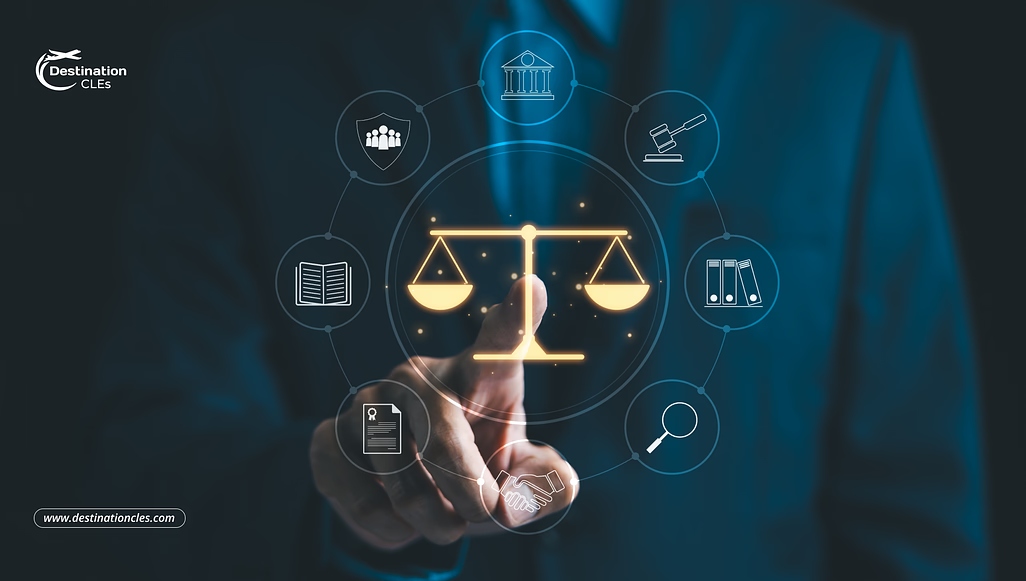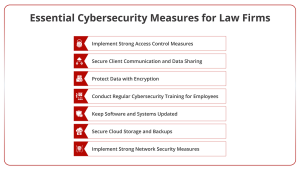Cyberattacks are on the rise, and law firms are becoming prime targets. According to the American Bar Association (ABA), nearly 29% of law firms reported experiencing a data breach.
Lawyers must understand how to protect client data, comply with privacy laws, and use technology to improve efficiency. Staying updated on the latest tools and cybersecurity best practices has become essential. Attending CLE courses and legal tech conferences allows lawyers to gain hands-on experience with new technologies, learn from cybersecurity experts, and stay ahead of emerging risks.
Destination CLEs conferences provide valuable insights from industry experts while offering networking opportunities with other legal professionals. They are held in exotic locations worldwide, combining education with an unforgettable experience.
Why Are Law Firms Prime Targets?
As a law firm, you handle confidential client data, including business secrets, financial records, intellectual property, and litigation strategies. This makes you an attractive target for cybercriminals looking to exploit or sell sensitive information.
Unlike financial institutions, which have strict cybersecurity protocols, many law firms lack the same level of protection. Hackers know this and see law firms as easy entry points for stealing valuable data. You often work with high-profile corporate clients and government entities, making your firm a gateway to highly sensitive legal and financial information.
In some cases, attackers aren’t just looking to steal data; they may want to disrupt legal proceedings, gain an advantage in corporate negotiations, or even use stolen data for blackmail and extortion. This is why it’s critical to understand the most common cyber threats targeting law firms and take action to prevent them.
Common Cyber Threats to Law Firms
Here are the primary cybersecurity threats you need to watch out for:
Phishing Attacks
Phishing is one of the most common and effective cyberattacks against law firms. You or your staff may receive fraudulent emails that appear legitimate, often impersonating a client, court, or trusted service provider.
These emails contain malicious links that steal login credentials and attachments with malware that infects your system and requests sensitive information, such as bank details or case files.
If a member of your firm falls for a phishing scam, attackers can access your email accounts, internal networks, and confidential legal documents.
Ransomware Attacks
Ransomware locks access to your files and systems until you pay a ransom. Law firms are frequent targets because your work depends on access to legal documents, case files, and client records. If attackers encrypt your data, you may be forced to pay thousands or even millions of dollars to regain access.
Even if you pay, there’s no guarantee that cybercriminals will unlock your files or that your data hasn’t already been copied and leaked. Ransomware attacks can shut down your firm for days or weeks, leading to missed court deadlines and damaged client relationships.
Insider Threats
Not all cyber threats come from outside. Employees, interns, or even former staff can pose a risk to your law firm’s security. These insider threats can be unintentional, intentional, or negligence based. Since lawyers and support staff have access to highly sensitive client data, insider threats are among the hardest to detect and prevent.
Data Breaches
A data breach occurs when unauthorized individuals access your firm’s private information. Cybercriminals can break into your systems through weak passwords, compromised credentials, and unpatched software vulnerabilities.
If your firm experiences a data breach, client data could be stolen, exposed, or sold on the dark web. The consequences include reputation damage, financial penalties, and legal action from affected clients.
Man-in-the-Middle (MITM) Attacks
MITM attacks happen when a hacker intercepts communication between you and your client or colleague. This often occurs when using public Wi-Fi or unsecured networks. Attackers can monitor and steal confidential conversations, alter emails or legal documents before they reach the recipient, and redirect payments by changing banking details in invoices.
For example, if a hacker intercepts an email discussing a financial transaction, they could modify the payment details and trick your client into sending money to a fraudulent account.
Essential Cybersecurity Measures for Law Firms
Protecting client data should be a top priority for your law firm. Here are the essential steps you should take.
Implement Strong Access Control Measures
Not everyone in your firm needs access to all information. Limiting access to only those who need it is crucial for protecting client data.
Use Multi-Factor Authentication (MFA)
Even if a password is compromised, MFA adds an extra layer of security by requiring a second verification form (such as a phone authentication app or biometric scan).
Restrict Access with Role-Based Access Control (RBAC)
Give employees access to the files and systems necessary for their work. A paralegal, for example, should not have the same level of access as a senior partner.
Enforce Strong Password Policies
Require long, complex passwords or passphrases. Encourage password managers to securely store and generate passwords instead of reusing them across accounts.
Secure Client Communication and Data Sharing
Many cyber threats stem from insecure communication methods. Hackers often target email through phishing attacks or unauthorized access. Protecting how you communicate with clients is essential.
Use End-to-End Encrypted Messaging and Email Services
Platforms like Signal, ProtonMail, or WhatsApp encrypt conversations so only the sender and recipient can read them.
Avoid Using Public Wi-Fi for Legal Discussions
Hackers can easily intercept unsecured Wi-Fi connections. Always use a VPN (Virtual Private Network) to secure your connection if you must work remotely.
Implement Secure Client Portals
Instead of emailing sensitive documents, use encrypted client portals where clients can securely upload and access legal documents.
Protect Data with Encryption
Encryption ensures that even if hackers gain access to your files, they won’t be able to read them without the proper decryption keys.
Encrypt Stored Data
All client records, legal contracts, and confidential case files should be encrypted, whether stored on-premises or in the cloud.
Encrypt Transmitted Data
Always use SSL/TLS encryption when transmitting information online. This will ensure the security of any data shared between you and your clients.
Use Full-Disk Encryption on Laptops and Mobile Devices
Encryption prevents unauthorized access to stored data if a lawyer’s laptop or phone is lost or stolen.
Conduct Regular Cybersecurity Training for Employees
Your employees are often the first line of defense against cyber threats. Many breaches happen because someone unknowingly clicks a malicious link or shares sensitive information with a scammer. Regular training can prevent these mistakes.
Educate Staff on Recognizing Phishing and Social Engineering Attacks
Train lawyers and staff to be suspicious of unexpected emails asking for login credentials, attachments, or payment details.
Conduct Cybersecurity Awareness Programs Periodically
Hold quarterly or annual training sessions to inform your team about the latest threats and how to prevent them.
Simulate Phishing Attacks
Conduct periodic tests where employees receive fake phishing emails to see how they respond. If someone falls for it, they should receive additional training.
Keep Software and Systems Updated
Hackers often exploit outdated software with known security flaws. Keeping everything updated ensures you’re protected from the latest threats.
Regularly Update Case Management Software and Legal Platforms
Many law firms use legal practice management software (such as Clio or MyCase). Keeping these updated ensures you have the latest security patches.
Enable Automatic Updates
Your firm’s operating systems, browsers, and antivirus software should be set to update automatically to fix vulnerabilities as soon as possible.
Patch Third-Party Software
You should always update any software you use, including PDF readers, email clients, and cloud storage applications, to the latest version.
Secure Cloud Storage and Backups
Many law firms use cloud storage for case files, contracts, and other legal documents. While cloud storage is convenient, it must be secure to prevent unauthorized access or data loss.
Use Reputable Cloud Service Providers
Choose a cloud storage provider that complies with legal industry regulations and offers strong security features, such as encryption and access controls.
Implement Regular Data Backups
Back up your data daily or weekly and store copies offsite or in an encrypted cloud backup service.
Use Immutable Backups
An immutable backup cannot be altered or deleted, preventing hackers from encrypting or destroying your data in a ransomware attack.
Implement Strong Network Security Measures
Your law firm’s network should be well-protected to prevent unauthorized access to internal systems and client data.
Deploy Firewalls and Intrusion Detection Systems (IDS)
A firewall blocks unauthorized access, while an IDS monitors network traffic for suspicious activity.
Use Virtual Private Networks (VPNs) for Remote Access
If lawyers need to access case files while traveling or working remotely, they should always use a VPN to encrypt their connection.
Implement Endpoint Security Solutions
Every device in your firm (computers, tablets, and phones) should have antivirus and anti-malware protection installed.
Legal and Ethical Considerations in Cybersecurity
Attorney-client privilege and Confidentiality
Confidentiality is a core principle of legal ethics. If a law firm’s cybersecurity is weak, sensitive client information could be exposed to hackers, competitors, or even the public. To uphold ethical responsibilities, encrypted communication, and storage must be used to protect privileged client data. Access controls must be implemented to ensure that only authorized staff can view confidential files. Security policies must also be regularly audited to identify and fix vulnerabilities.
Compliance with Cybersecurity Regulations
Law firms must comply with various data protection laws to safeguard client data. Some key regulations include:
- ABA Model Rules of Professional Conduct (Rule 1.6) – Lawyers must take reasonable steps to prevent unauthorized access to client information. This includes using cybersecurity tools and training staff on data protection.
- General Data Protection Regulation (GDPR) – If your firm handles client data from the EU, you must secure personal information, provide breach notifications, and limit data collection.
- California Consumer Privacy Act (CCPA) – Firms dealing with California residents must follow strict data security measures, give clients control over their data, and report breaches.
To stay compliant, your firm should develop a formal cybersecurity policy covering data protection, device usage, and remote work guidelines. Implement an incident response plan, so your team knows what to do in case of a cyberattack. Review and update policies regularly as new threats emerge.
Continuing Legal Education (CLE) and Technology Training
Staying technologically competent is a requirement for modern legal practice. Law firms should enroll in Continuing Legal Education (CLE) courses focusing on cybersecurity, electronic discovery, and legal tech. Legal professionals should be encouraged to pursue specialized training programs and certifications in cybersecurity. Participate in conferences, online workshops, and legal tech communities to stay informed about emerging threats.
For a more immersive learning experience, Destination CLEs offer the perfect blend of legal education and networking in stunning locations worldwide, allowing professionals to gain valuable insights while enjoying a unique and enriching environment.
Earn CLE Credits While Exploring the World with Destination CLEs
Destination CLEs redefine the way legal professionals meet their continuing education requirements. Our conferences blend educational opportunities with cultural immersion in some of the world’s most captivating cities.
Why Choose Destination CLEs?
- Meet CLE Requirements: Fulfill your mandatory CLE credits through engaging, high-quality seminars in stunning global locations.
- Transformative Learning: This approach turns lecture-based learning upside down by engaging in sessions as dynamic as the destinations.
- Networking Opportunities: Connect with peers worldwide, expanding your professional network in settings that encourage collaboration and growth.
- All-Inclusive Experience: Enjoy comprehensive packages that cover educational sessions, accommodations, and unique cultural experiences, making your learning adventure seamless and memorable.
- Efficient Credit Earning: Earn required CLE credits efficiently, with schedules that balance professional development and exploration.
Plan your next educational journey with Destination CLEs and ensure extraordinary professional development. Our 2024-2025 lineup includes diverse locales such as the Alaska Cruise, Mediterranean Sea Cruise, and Athens, Greece — each offering a distinct blend of legal education and local culture.
Secure your spot today and become part of a community dedicated to professional growth and networking.









